If you’re looking for the best network scanning hardware in 2025, I recommend considering versatile all-in-one kits like the ZOERAX 11-in-1 or Klein Tools VDV001819, which combine crimpers, testers, and punch-down tools. These support various cable types and wiring standards, making installations, troubleshooting, and maintenance easier. Durable construction and compatibility with existing setups are key. Keep exploring to discover the top tools that will keep your network secure and efficient all year round.
Key Takeaways
- Focus on tools supporting multiple cable types (Cat 5, Cat 6, coax) for versatile network scanning.
- Prioritize hardware with robust construction, durable casings, and ergonomic features for long-term reliability.
- Look for devices with advanced features like auto-scan, long-range detection, and compatibility with various connectors.
- Consider tools that integrate testing, verification, and troubleshooting functions to streamline network management.
- Evaluate cost-to-performance ratio to ensure investment in high-quality, future-proof network scanning hardware.

Cable Matters 7-in-1 Network Tool Kit with RJ45 Ethernet Crimping Tool, Punch Down Device, Punch Down Stand, Cable Tester, RJ45 Connectors & Boots, and Wire Strippers - Carrying Case Included
Take command of your network with the Cable Matters Network Toolkit with Carrying Case; 7-in-1 Ethernet cable tool...
As an affiliate, we earn on qualifying purchases.
Cable Matters 7-in-1 Network Tool Kit with Ethernet Crimping Tool and Accessories
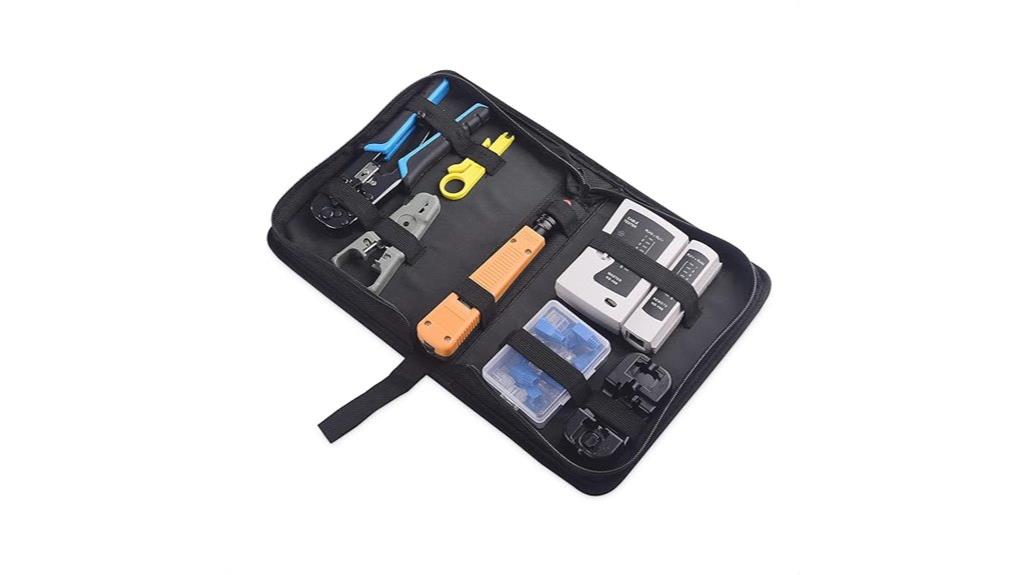
If you’re an IT professional or a DIY enthusiast looking for a reliable all-in-one tool, the Cable Matters 7-in-1 Network Toolkit is an excellent choice. This kit includes essential tools like a multi-functional RJ45 crimper with built-in cutter, stripper, and crimper for Cat6, RJ-45, RJ-12, and RJ11 cables. It also features a punch down tool, a cable tester, and connectors, all stored in a durable carrying case. Designed for building, testing, and deploying Ethernet networks, it offers convenience and versatility for small projects or home use. While some testers may need verification or batteries, overall, it provides great value and all-encompassing functionality.
Best For: DIY enthusiasts and small-scale IT professionals seeking a comprehensive, portable network tool kit for building and testing Ethernet cables.
Pros:
- Includes a wide range of essential tools in one convenient kit for versatile network work
- Compact and durable carrying case for organized storage and transport
- User-friendly design suitable for both beginners and occasional professionals
Cons:
- Some testers may be defective or require batteries, necessitating additional purchases and verification
- Tools may not be durable enough for frequent or heavy professional use
- Limited to small projects or home use, less ideal for large-scale or industrial networking tasks

NSHL-468 RJ45 RJ11 RJ12 CAT5 CAT 6 UTP Network Lan Cable Tester Test Tool
Cable Tester Networking Tool for RJ-11, RJ-12, RJ-45, CAT5, CAT5e, 10/100 Base-T, TIA-568A / 568B, AT and T...
As an affiliate, we earn on qualifying purchases.
NSHL-468 RJ45 RJ11 RJ12 CAT5 CAT 6 UTP Network Lan Cable Tester Test Tool
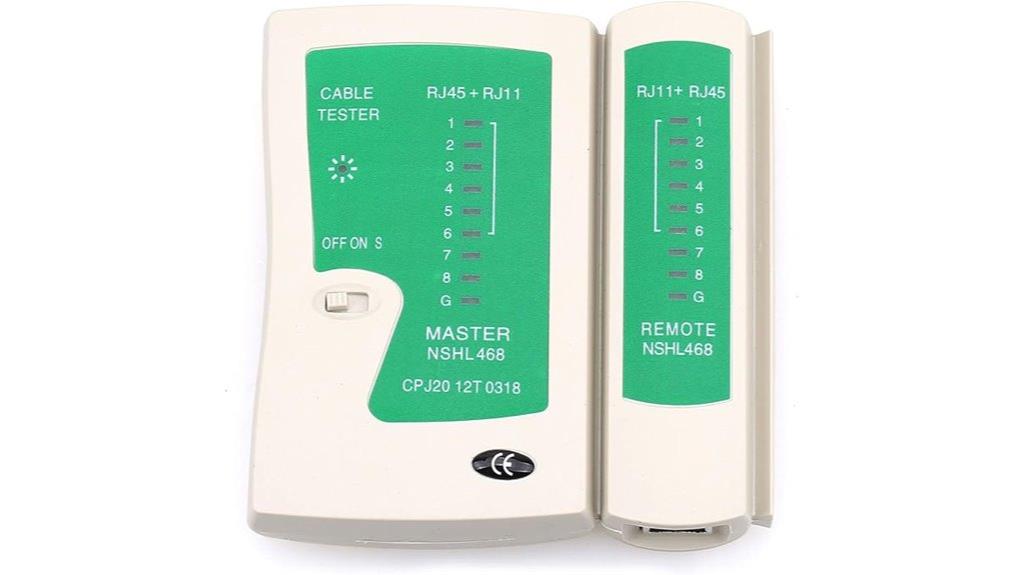
The NSHL-468 RJ45 RJ11 RJ12 CAT5 CAT6 UTP Network LAN Cable Tester stands out as an ideal choice for technicians and network professionals who need quick, reliable cable troubleshooting. Its compatibility with various standards like TIA-568A/568B and support for cables up to 1000 feet make it versatile. With 9 LED indicators, it easily identifies wiring issues on both remote and master units. The auto-scanning feature speeds up testing, while its straightforward design simplifies troubleshooting for network, phone, and data cables. Weighing just 3.52 ounces, it’s portable, easy to use, and an affordable tool that helps save time and reduce guesswork.
Best For: network technicians, IT professionals, and home users seeking quick, reliable cable testing and troubleshooting.
Pros:
- Supports multiple standards including RJ45, RJ11, RJ12, CAT5, and CAT6 for versatile use.
- Equipped with 9 LED indicators for clear, immediate wiring status on both units.
- Portable and lightweight design makes it easy to carry and operate in various environments.
Cons:
- Some users report reliability issues, especially with units purchased used or from non-English sources.
- Instructions are mainly in Chinese, which may require additional guidance for English speakers.
- Performance can vary, with occasional failure on known good cables or malfunctioning out of the box.

RJ45 Crimp Tool Kit Pass Thru Ethernet Crimper for Cat5e Cat6 Cat6a 8P8C Modular Connectors, All-in-One Cat6 Crimping Tool and Tester(9V Battery Not Included)
Professional RJ45 Crimper: Ethernet crimping tool kit includes RJ45 Crimper Pass Through,20PCS CAT6 Pass-Thru Connectors, 20PCS Connector Covers,...
As an affiliate, we earn on qualifying purchases.
RJ45 Crimp Tool Kit for Ethernet Connectors
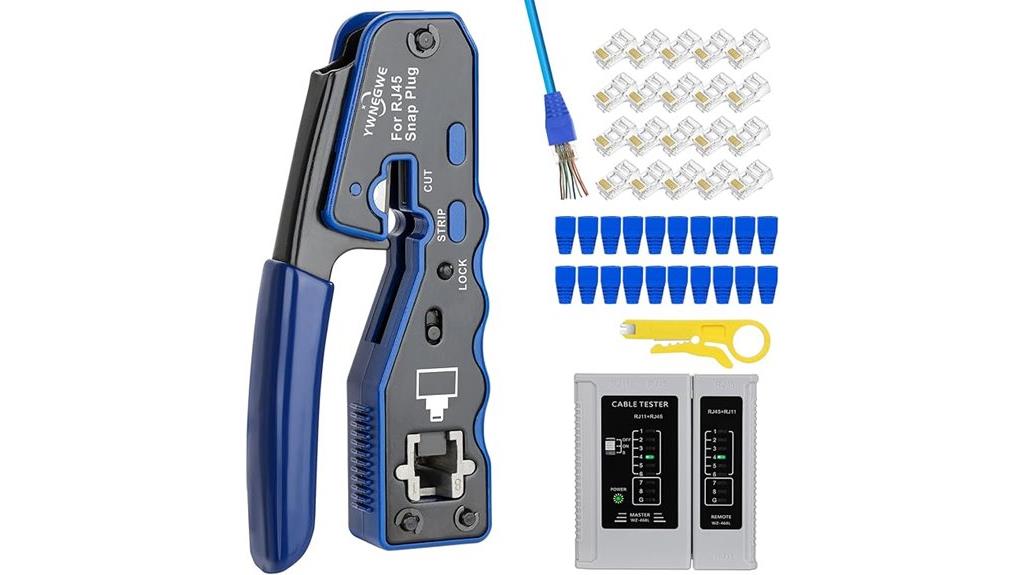
When selecting a reliable RJ45 crimp tool kit, durability and versatility top my list—especially for professional network installers or serious DIY enthusiasts. The YWNEGWE RJ45 Crimp Tool Kit offers everything I need: a pass-through crimper, connectors, covers, a wire stripper, and a network cable tester. Made from heavy-duty steel with an ergonomic handle, it’s built to last and comfortable to use. It supports CAT5e, CAT6, and shielded variants, making it perfect for various wiring projects. The kit’s all-in-one function simplifies wire prep and crimping, and the built-in tester ensures proper connections. It’s a reliable, versatile choice for any networking task.
Best For: professional network installers and serious DIY enthusiasts seeking a durable, all-in-one crimping solution for various Ethernet wiring projects.
Pros:
- Made from heavy-duty steel with an ergonomic handle for durability and comfort
- Supports multiple wire types including CAT5e, CAT6, and shielded variants
- Combines wire stripping, cutting, crimping, and testing functions in one tool
Cons:
- Manual operation means it requires physical effort and may be tiring for extended use
- Battery for the network cable tester is not included, requiring an additional purchase
- Slightly heavier at approximately 1.25 pounds, which may be less ideal for prolonged handheld use

ZoeRax Ethernet crimping tool kit RJ45 crimp tool, Cat5 Cat6 Pass Through Crimping Tool for Network Cable Tester, Multiply Stripper, 50PCS Cat 6 Pass Through Connectors and Strain Relief Boots
RJ45 Crimp Tool Kit: ZoeRax kits included Pass Through RJ45 Crimper tool, Network Cable Tester, Wire Cutters Pliers,...
As an affiliate, we earn on qualifying purchases.
Ethernet Crimping Tool Kit with Connectors and Strain Relief Boots
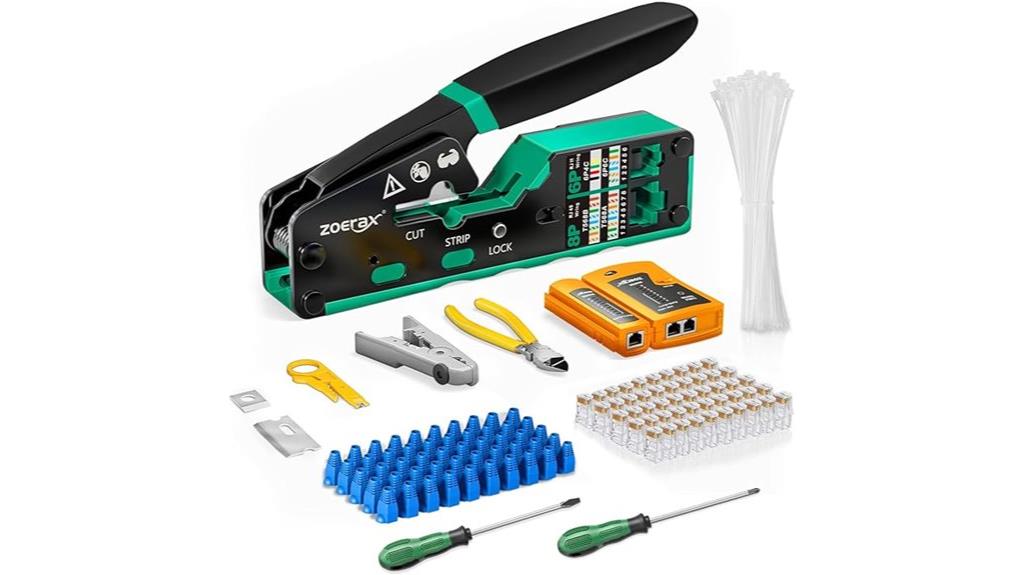
Designed for network technicians and DIY enthusiasts alike, the Ethernet Crimping Tool Kit with Connectors and Strain Relief Boots offers an all-encompassing solution for reliable cable assembly. It includes a Pass Through RJ45 crimper that can crimp, strip, and cut STP/UTP cables, supporting 4, 6, and 8-position modular connectors. With 50 CAT6 pass-through connectors and strain relief boots, it guarantees secure, durable connections. The kit also features a network cable tester to verify proper data transmission and protect equipment during testing. Additional tools like wire cutters, a multipurpose stripper, screwdrivers, and cable ties make installation and maintenance efficient and straightforward.
Best For: DIY enthusiasts and network technicians seeking a comprehensive, all-in-one cable assembly and testing toolkit for reliable network installations.
Pros:
- Combines multiple tools (crimping, stripping, cutting, testing) in one kit for convenience
- Supports various connector types (4, 6, 8-position RJ45, RJ11/RJ12) for versatile use
- Includes 50 CAT6 pass-through connectors and strain relief boots for durable, secure connections
Cons:
- Battery-dependent cable tester requires 9V batteries (not included)
- May be bulky for small or portable toolkits
- Limited information on tool ergonomic features or long-term durability
Network Tool Kit for Cat5, Cat5e, Cat6 Ethernet Cables
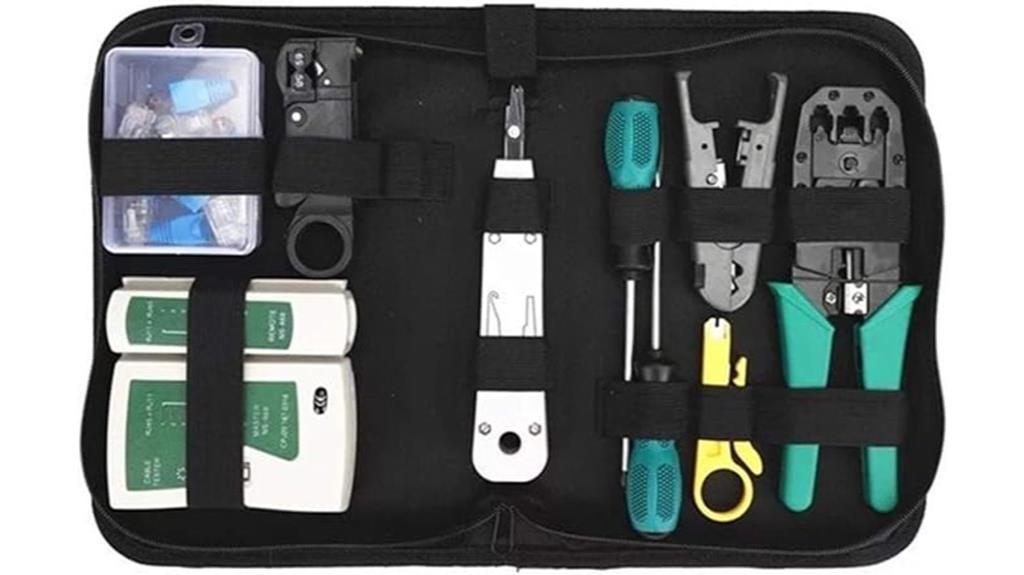
For professionals and DIY enthusiasts working with Cat5, Cat5e, or Cat6 Ethernet cables, having a complete network tool kit is essential. This 11-in-1 set includes everything needed for installation and troubleshooting, such as an Ethernet crimping tool, cable tester, wire stripper, and punch-down tool. The ergonomic design and portable case make it easy to carry around, whether at home, in the office, or in the lab. The crimper works with RJ45, RJ11, and RJ12 connectors, while the tester supports various standards. Overall, this kit streamlines network setup, saving time and ensuring reliable connections.
Best For: DIY enthusiasts, network technicians, and professionals needing a comprehensive toolkit for installing, repairing, and troubleshooting Cat5, Cat5e, and Cat6 Ethernet cables.
Pros:
- All-in-one set with 11 essential tools for network setup and maintenance
- Compatible with multiple connector types (RJ45, RJ11, RJ12) and cables (Cat5, Cat5e, Cat6)
- Portable and ergonomic design with a durable carrying case for easy transport and storage
Cons:
- RJ45 connectors are standard, not pass-through, which may limit some connection types
- 9V battery for the cable tester is not included, requiring an additional purchase
- Not compatible with pass-through crimping tools, potentially reducing versatility for some users
RJ45 Crimp Tool Kit with Connectors, Covers, Cutter & Cable Tester
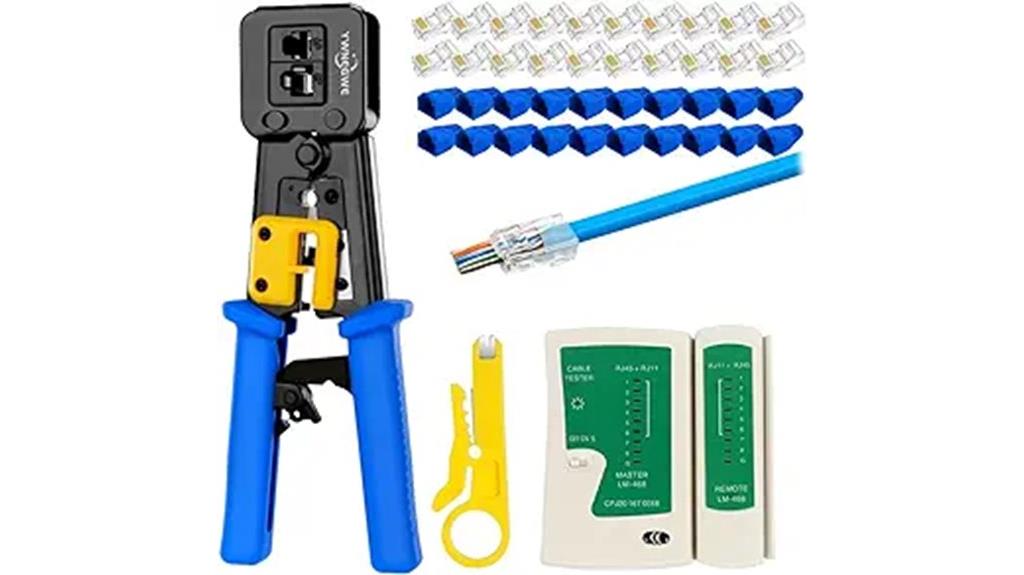
The RJ45 Crimp Tool Kit by YWNEGWE stands out as an essential choice for DIY enthusiasts and professional installers alike, thanks to its all-in-one design. It includes a professional pass-through crimping tool compatible with Cat5, Cat5e, and Cat6 connectors, along with 20 connectors, covers, a mini punch-down cutter, and a cable tester. Built from durable high carbon steel with ergonomic handles, it guarantees precise crimps and cuts on Ethernet and phone cables. While the cable tester may be less reliable, the kit’s extensive tools make cable installation easier, faster, and more reliable—perfect for home networking projects or professional setups.
Best For: DIY enthusiasts and professional network installers seeking a comprehensive, durable tool kit for cable crimping, cutting, and testing.
Pros:
- Includes all essential tools and connectors in one kit for convenience and cost savings
- Durable high carbon steel construction ensures long-lasting performance
- Ergonomic handles provide comfort during extended use
Cons:
- Cable tester may be unreliable or confusing, requiring alternative verification methods
- Some users find the wire stripper less sharp, impacting clean wire preparation
- Blades on the crimping tool might not be very sharp, resulting in less precise cuts
InstallerParts 15-in-1 Network Tool Kit with Crimper, Cable Tester, Wire Stripper, and Punch Down Tool
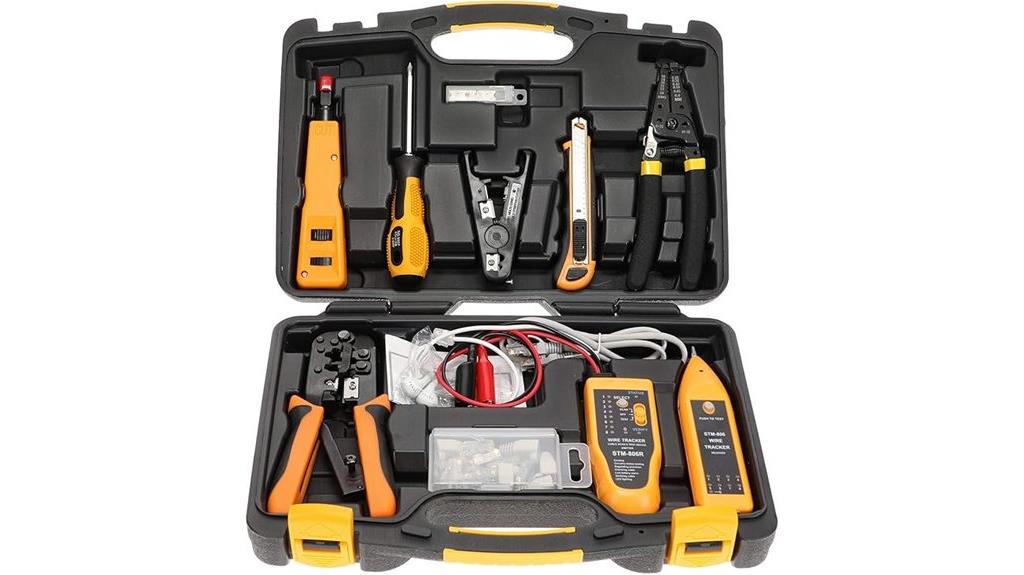
If you’re looking for a versatile, all-in-one network tool kit that meets the demands of both professionals and DIY enthusiasts, the InstallerParts 15-in-1 Network Tool Kit stands out. It includes essential tools like a crimper, cable tester, wire stripper, and punch down tool, all in a lightweight, durable case. The high-quality RJ45 crimper works with various cables, and the tester quickly verifies connections. The kit’s ergonomic design and safety features make installation safer and easier. With 15 pieces packed into a compact case, it’s perfect for on-the-go use, ensuring you have everything needed for reliable network setup and maintenance.
Best For: Professional network technicians and DIY enthusiasts seeking a comprehensive, portable tool kit for reliable network installation and maintenance.
Pros:
- All-in-one set with 15 essential network tools for versatility and convenience
- High-quality RJ45 crimper compatible with multiple cable types for professional-grade connections
- Durable, lightweight hard case for easy transport and organized storage
Cons:
- Batteries for the cable tester are not included, requiring an additional purchase
- Some users may find the case size slightly bulky for very tight spaces
- The set may be more than necessary for casual or infrequent users, representing a higher investment
Trophable Network Tool Kit, 12-in-1 RJ45 Crimp & Pass Through Tool Set

The Trophable Network Tool Kit, 12-in-1 RJ45 Crimp & Pass Through Tool Set stands out as an essential choice for network professionals and DIY enthusiasts alike. Its lightweight, durable design makes it perfect for home, office, or outdoor projects. The kit includes a pass-through crimper, tester, punch down tool, stripper, cutter, and accessories, all organized in a portable case. It supports various cable types and connectors, making termination straightforward. Plus, the multi-function tester verifies LAN connections easily. With a solid 4.4-star rating from 87 reviews, this versatile set offers reliable performance and convenience, making it a must-have in any network toolkit.
Best For: DIY enthusiasts, network professionals, and anyone needing a comprehensive, portable tool set for network cable installation and testing.
Pros:
- Includes a wide range of tools in one set, such as crimper, tester, punch down tool, stripper, and cutters, providing versatility for various tasks.
- Lightweight and compact design with a durable case makes it easy to carry and organized for on-the-go projects.
- Supports multiple cable types and connectors, simplifying termination and installation processes.
Cons:
- Requires 9V batteries for the tester, which are not included, adding an extra step for operation.
- Some users may find the tool set less suitable for heavy-duty professional use due to its lightweight construction.
- The absence of detailed instructions for certain tools could pose a learning curve for beginners.
ZOERAX 11-in-1 RJ45 Network Tool Kit
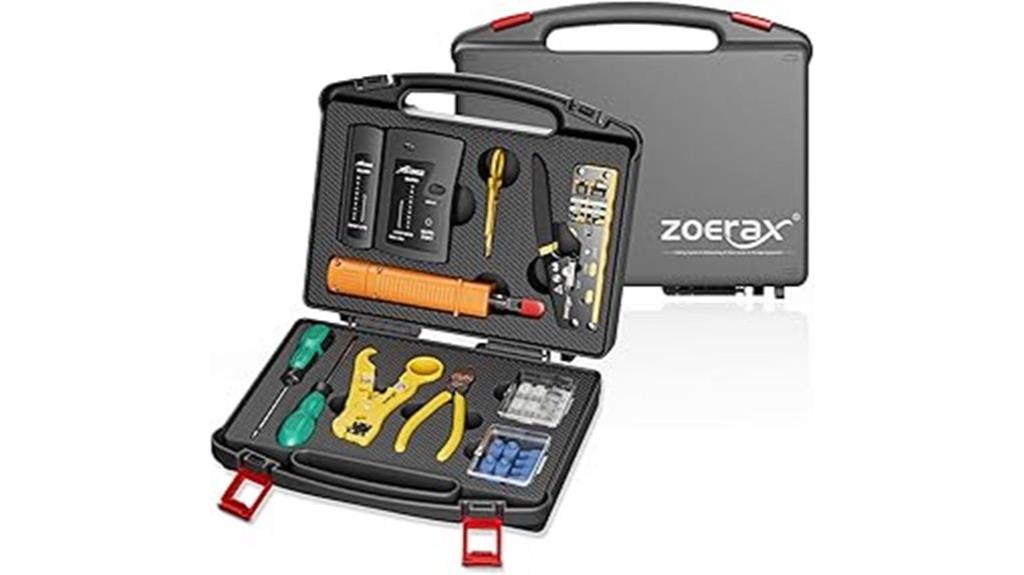
Designed for both professionals and DIY enthusiasts, the ZOERAX 11-in-1 RJ45 Network Tool Kit stands out with its all-inclusive set of high-quality tools housed in a durable, lightweight case. Weighing just 2.82 pounds, it’s easy to carry and use in various environments. The kit features a pass-through crimper compatible with multiple connector types, along with cable cutters, strippers, and a multi-function tester to ensure reliable connections. It includes 10 Cat6 pass-through connectors, RJ45 boots, and extra blades, making it versatile for any networking task. Overall, it offers excellent value, durability, and efficiency for both DIYers and professionals.
Best For: DIY enthusiasts and professionals seeking a comprehensive, durable, and portable networking tool kit for efficient cable termination and testing.
Pros:
- All-in-one set with high-quality tools including crimper, cutters, strippers, and a multi-function tester.
- Lightweight and portable design, making it easy to carry and use in various environments.
- Compatible with both name-brand and generic RJ45 connectors, offering great value and versatility.
Cons:
- Occasionally, the lock mechanism on the crimper may engage unintentionally.
- Stripping blades may cut deeper than desired, requiring additional trimming.
- The cable tester requires a 9V battery (not included), which could be an inconvenience.
Hi-Spec 9pc Network Cable Tester Tool Kit Set

The Hi-Spec 9pc Network Cable Tester Tool Kit Set stands out for its all-encompassing testing capabilities, making it an ideal choice for network technicians and enthusiasts alike. It includes a tester box with a detachable remote unit, perfect for in-place testing of Cat 5, Cat 5e, Cat 6, and Cat 7 Ethernet cables, as well as RJ11 telephone cables, supporting networks up to 300 meters. The kit also features crimping, stripping, punch down, and coaxial cable tools, all stored in a durable, splash-proof case. This extensive set simplifies cable verification, installation, and repair, ensuring you have everything needed for professional-grade network maintenance.
Best For: professional network technicians, IT specialists, and serious hobbyists seeking a comprehensive toolkit for cable testing, installation, and maintenance.
Pros:
- All-in-one set with testing, crimping, stripping, and punching tools for versatile cable work.
- Supports in-place testing of multiple Ethernet and telephone cable types up to 300m.
- Durable, splash-proof case keeps tools organized and portable for on-site use.
Cons:
- May be more equipment than casual users need, making it somewhat costly.
- The kit requires some familiarity with network cabling for effective use.
- Limited to Ethernet and telephone cables, not suitable for other types of cabling or fiber optic work.
Klein Tools VDV001819 Tool Set with Cable Tester and Accessories

If you’re a network professional seeking a complete, all-in-one toolkit, the Klein Tools VDV001819 set stands out. This 6-piece kit, assembled in the USA, includes essential tools like the Scout Pro 3 Cable Tester, which locates and tests coax, data, and telephone cables with versatile capabilities. It also features a ratcheting crimper for cutting, stripping, and crimping Ethernet and voice cables, along with a multi-connector crimper for coaxial connectors. The set includes a durable snip, a precise cable stripper for fast, accurate prep, and a punchdown tool for terminating cables in panels. It’s a exhaustive solution for efficient network installation and testing.
Best For: network professionals and technicians seeking a comprehensive, all-in-one toolkit for cable installation, testing, and termination.
Pros:
- Includes a versatile set of essential tools assembled in the USA for quality and reliability.
- Features the Scout Pro 3 Cable Tester with broad testing capabilities for coax, data, and telephone cables.
- Combines multiple tools such as crimpers, a cable stripper, snips, and a punchdown tool in a compact case for convenience.
Cons:
- The all-in-one kit may be more expensive than purchasing individual tools separately.
- Heavy or bulky if carried for extended periods, due to multiple tools in one case.
- Limited to the specific tools included; may not cover all specialized cable or network installation needs.
Factors to Consider When Choosing Network Scanning Tool Hardware

When selecting network scanning tool hardware, I focus on key factors like compatibility with various cables, durability, and ease of use. It’s also important to take into account the testing range and portability features to ensure the tool fits my specific needs. By weighing these points, I can choose hardware that’s reliable and efficient for any situation.
Compatibility With Cables
Choosing a network scanning tool that supports the cable types used in your environment is vital for accurate testing and troubleshooting. You need to verify the device works with cables like Cat5, Cat6, RJ45, RJ11, or coaxial, depending on your setup. It’s also important that the tool can test both shielded (STP) and unshielded (UTP) cables, as this impacts noise reduction and overall performance. Compatibility with wiring standards such as TIA-568A or TIA-568B is essential for precise results. Additionally, verify that the device can handle cable lengths and complexities, including remote testers for cables up to 1000 feet. Finally, confirm it supports the connectors and configurations you use, whether pass-through or standard modular connectors, to ensure reliable compatibility across your network.
Durability and Build
A durable network scanning tool is essential for reliable performance, especially in demanding environments. I look for tools built from high-quality, corrosion-resistant materials like industrial steel or reinforced plastics, ensuring they withstand frequent use and rough handling. The build should feature robust hinges, secure latches, and impact-resistant casings to protect internal components from physical damage. Ergonomic handles with non-slip grips are crucial for comfort and reducing fatigue during long operation periods. For outdoor or industrial settings, weatherproof or water-resistant features are vital to prevent damage from environmental elements. Internal components, such as circuit boards and connectors, should be securely mounted and shielded against vibrations, drops, or electrical surges. Overall, a well-constructed, sturdy design guarantees longevity and consistent performance in tough conditions.
Ease of Use
Ease of use is a critical factor because it directly impacts how quickly and confidently you can operate a network scanning tool. An intuitive interface with clear navigation makes it accessible, even for those with limited technical experience. Tools that feature straightforward setup processes and minimal configuration help reduce the learning curve and allow faster deployment. Visual cues like LED lights or color-coded alerts simplify interpreting scan results, eliminating the need for complex analysis. Built-in tutorials, on-screen guides, or helpful prompts can accelerate understanding and improve efficiency. Ergonomic design and accessible controls also play a crucial role, reducing fatigue and enabling precise handling during scans. Ultimately, user-friendly hardware ensures you can focus on your tasks without unnecessary frustration or delays.
Testing Range
Ever wondered how far a network scanning tool can reach and still deliver accurate results? The testing range is vital because it determines the maximum distance over which the device can effectively detect and diagnose network connections. If you’re working in a large facility or outdoor environment, you’ll need a tool with a long range, often over 1,000 feet, to cover extensive cable runs. For smaller, indoor setups, a shorter range of about 100 to 300 feet usually suffices. Keep in mind, factors like cable type, shielding, and interference can affect the signal strength and accuracy at longer distances. Some advanced tools include auto-scan features, allowing quick evaluation of multiple segments within their maximum range, ensuring thorough coverage.
Portability Features
When selecting a network scanning tool, portability features play a crucial role in guaranteeing you can work efficiently across various environments. A lightweight design with compact dimensions makes transport easy and reduces fatigue during long sessions. A durable, impact-resistant case or pouch helps protect the device during travel and storage, ensuring longevity. Integrated handles or straps allow for quick carrying and better maneuverability, especially in dynamic work settings. Wireless or Bluetooth connectivity enables remote operation and data transfer, eliminating the need for bulky cables and increasing flexibility. Battery-powered operation with long-lasting or rechargeable batteries minimizes dependence on external power sources, supporting field mobility. These portability features collectively guarantee that your network scanning tool is convenient, reliable, and ready for use anytime, anywhere.
Power Source Needs
Choosing the right power source for your network scanning tool is essential to guarantee uninterrupted operation and accurate results. Most devices run on batteries, AC adapters, or USB connections, each with its advantages. Battery-powered tools often use 9V or AA batteries, which are easy to find and replace, making them ideal for field use. Some scanners come with rechargeable batteries, allowing multiple sessions without frequent replacements. External power sources like AC adapters or USB connections can offer longer operation times and more stability, but require compatible ports. Ensuring your scanning tool has a reliable and adequate power source is vital for continuous performance, especially during extended diagnostics. Carefully consider your typical use environment to select the most dependable power option for your needs.
Accuracy and Reliability
Selecting the right power source helps keep your network scanning tool running smoothly, but to get reliable results, you also need hardware that delivers consistent accuracy. High accuracy depends on precise signal detection, filtering out false positives and negatives. Reliable hardware maintains steady performance over time, resisting environmental factors like electromagnetic interference. The quality of internal components, such as sensors and circuit boards, directly influences the accuracy and dependability of scan results. Features like auto-calibration, real-time data verification, and thorough testing protocols further enhance reliability. Regular maintenance, firmware updates, and calibration are essential to prevent measurement drift and sustain precision. When choosing hardware, prioritize those with robust build quality and advanced features that support long-term accuracy, ensuring you get dependable, trustworthy network scans every time.
Cost and Value
Evaluating the cost and value of a network scanning tool involves more than just comparing prices; it requires considering whether the features, durability, and reliability justify the investment. Higher-priced tools often deliver advanced functionalities, better build quality, and longer-lasting components, providing greater long-term value. Cheaper options may offer basic testing but could sacrifice accuracy, durability, or compatibility, leading to higher replacement or repair costs over time. It’s also important to assess warranty coverage, customer support, and the availability of spare parts or accessories. Comparing the cost-to-performance ratio helps guarantee you select a tool that offers the best features and longevity relative to its price. Ultimately, investing in quality hardware can save money and improve efficiency in the long run.
Frequently Asked Questions
What Are the Key Differences Between Handheld and Rack-Mounted Network Scanning Hardware?
Handheld network scanning hardware is portable and ideal for quick, on-the-go assessments, making it perfect for fieldwork. Rack-mounted devices, on the other hand, are stationary and suited for all-encompassing, high-volume scanning in data centers or labs. I find handhelds offer flexibility and speed, while rack-mounted tools provide robustness and scalability. Your choice depends on whether you need mobility or extensive processing power for larger networks.
How Does Environmental Durability Affect Hardware Choice for Network Scanning Tools?
Environmental durability is vital when choosing network scanning hardware because it determines how well the device withstands harsh conditions like dust, moisture, and temperature extremes. I always opt for rugged tools if I work outdoors or in challenging environments, as they guarantee reliability and longevity. Durable hardware reduces downtime and maintenance costs, making it a smarter investment for continuous network monitoring in any setting.
Can Hardware Tools Support Emerging Network Standards Like 10GBE or Wi-Fi 6?
Yes, hardware tools are increasingly supporting emerging standards like 10GbE and Wi-Fi 6. I look for devices with compatible network interfaces and robust processing power to handle high data speeds and new protocols. Upgrading my hardware guarantees I stay ahead of evolving network technologies, providing faster, more reliable scans. Investing in future-proof equipment means I can adapt seamlessly as standards continue to advance, saving time and resources in the long run.
What Is the Typical Lifespan of Network Scanning Hardware in Professional Use?
In my experience, the typical lifespan of network scanning hardware in professional use is about 3 to 5 years. This depends on factors like hardware quality, usage intensity, and technological advancements. I recommend regularly updating or upgrading your tools to keep pace with evolving network standards such as 10GbE and Wi-Fi 6. Staying current guarantees peak performance and reliable security assessments.
Are There Specific Hardware Features That Improve Troubleshooting Efficiency?
Absolutely, features like high-speed processors, ample RAM, and multiple network interfaces markedly boost troubleshooting efficiency. I look for rugged durability and portable designs so I can work on-site comfortably. Having versatile connectivity options, like Wi-Fi 6 and Ethernet, helps me quickly identify issues across different networks. A clear, responsive display and user-friendly controls also make my troubleshooting faster and more accurate, saving me time and reducing frustration.
Conclusion
Choosing the right network scanning tool hardware is like finding the perfect key for your security lock—each one *unlocks* new possibilities. With options ranging from all-in-one kits to specialized testers, you can tailor your gear to fit your needs. Remember, the right tool can turn a tangled web into a smooth highway. So, take your time, pick wisely, and watch your network flow seamlessly like a well-oiled machine.







